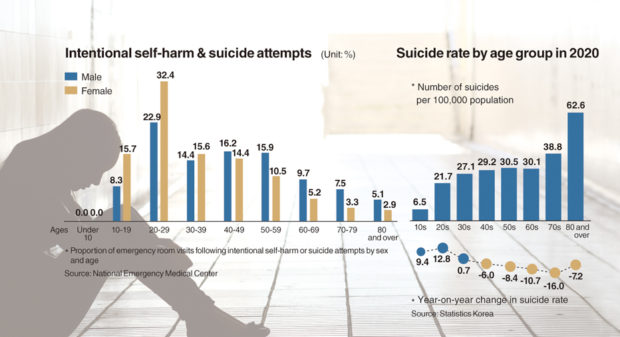
(The Korea Herald/Asia News Network)
SEOUL — Suicides among young people, especially women, increased during the first year of the COVID-19 crisis in 2020, despite a drop overall in South Korea.
The number of suicides fell by 604 to 13,195 in 2020 compared to the previous year, according to the Ministry of Health and Welfare’s report published Tuesday. The ministry said preliminary data from 2021 indicated a continued declining trend.
The suicide rate per 100,000 people was 25.7 in 2020, far below the 31.7 seen in 2011 — the highest since the statistics began. Other recent recorded rates were 26.9 in 2019, 26.6 in 2018 and 24.3 in 2017.
Contrary to the declining trend, suicides were up in women and young people under the age of 30.
Suicides went down for men on-year by 6.5 percent to 35.5 per 100,000 population in 2020. For women, on the other hand, suicides rose for the third consecutive year in 2020 to 15.9 from 2019’s 15.8, 2018’s 14.8 and 2017’s 13.8
Women also made up 60.7 percent of 34,905 people taken to emergency rooms with deliberate self-harm or suicide attempts in 2020, about 1.54 times that of men, the National Emergency Medical Center’s data showed.
Women in their 20s, in particular, had the highest rate of ER visits following both nonfatal suicide attempts and suicides at 32.4 percent, followed by their male peers at 22.9 percent.
While women made more suicide attempts than men, more men lost their lives to suicide. In 2020, men died by suicide or self-harm more than twice as often as women.
Increasingly more young Koreans are dying by suicide even before the pandemic hit.
In 2020, 957 children and adolescents ages 9-24 took their own lives — almost 2 per day — indicating an increase for the fourth year in a row. For the three preceding years from 2017 to 2019, the number of suicides in this age group was 722, 827 and 876, respectively.
In a closed-door briefing Tuesday, Won So-yoon, head of the ministry’s suicide prevention policy division, told reporters that the reasons for the increases or decreases in suicides in particular groups were “difficult to pinpoint.”
The findings from the psychological autopsies, conducted by a ministry-run foundation established last year for mental health and suicide prevention, are not yet available, she said.
Police analysis of unnatural deaths revealed that for women of all ages, struggles with mental health were the most common motivations for both attempted and completed suicides. For men younger than 30, suicides were also most commonly driven by mental health issues. For older men, financial hardships and deteriorations in physical health were the main cause of suicide.
Suicide is the leading cause of death for people ages 10-39, and the second leading cause of death for people ages 40-59.
For most of the last two decades, Korea has had the highest suicide rates in Organization for Economic Cooperation and Development except for 2016 and 2017, when it came second to Lithuania. Korea’s suicide rate is more than double the OECD average of 11 per 100,000 population.
RELATED STORIES
Young Koreans exposed to songs that encourage suicide
Seoul mayor in apparent suicide after #MeToo allegations
Korean found dead in apparent suicide at Subic Bay
South Korean comedienne found dead with her mother